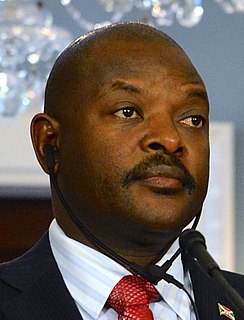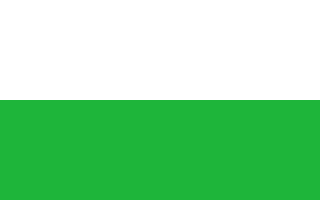
Burundi is one of the few countries in Africa, along with its closely linked neighbour Rwanda among others, to be a direct territorial continuation of a pre-colonial era African state.
Human occupation of Rwanda is thought to have begun shortly after the last ice age. By the 16th century, the inhabitants had organized into a number of kingdoms. In the 19th century, Mwami (king) Rwabugiri of the Kingdom of Rwanda conducted a decades-long process of military conquest and administrative consolidation that resulted in the kingdom coming to control most of what is now Rwanda. The colonial powers, Germany and Belgium, allied with the Rwandan court.
Domitien Ndayizeye is a Burundian politician who was President of Burundi from 2003 to 2005. He succeeded Pierre Buyoya, as president on 30 April 2003, after serving as Buyoya's vice president for 18 months. Ndayizeye remained in office until succeeded by Pierre Nkurunziza on 26 August 2005.

The Burundian Civil War was an armed conflict lasting from 1993 to 2005. The civil war was the result of long standing ethnic divisions between the Hutu and the Tutsi ethnic groups in Burundi. The conflict began following the first multi-party elections in the country since independence from Belgium in 1962, and is seen as formally ending with the swearing in of Pierre Nkurunziza in August 2005. Children were widely used by both sides in the war. The estimated death toll stands at 300,000.

The village of Gatumba lies on the western side of Burundi, near the border with the Democratic Republic of the Congo. The place is known for a massacre that took place at a refugee camp connected to the village.
The Titanic Express massacre was an event which took place on 28 December 2000, in which 21 people were killed in an attack on a Titanic Express bus, close to Bujumbura.

The National Liberation Front is an ethnically Hutu political party in Burundi that was formerly active as militant rebel group before and during the Burundian Civil War.
Since Burundi's independence in 1962, there have been two events called genocides in the country. The 1972 mass killings of Hutus by the Tutsi-dominated army, and the 1993 mass killings of Tutsis by the majority-Hutu populace are both described as genocide in the final report of the International Commission of Inquiry for Burundi presented to the United Nations Security Council in 1996.

The National Forces of Liberation is a political party and former rebel group in Burundi. An ethnic Hutu group, the party was previously known as the Party for the Liberation of the Hutu People.
These are some of the articles related to Burundi on the English Wikipedia:

Presidential elections were held in Rwanda on 9 August 2010, the second since the Rwandan Civil War. Incumbent President Paul Kagame of the Rwandan Patriotic Front (RPF) was re-elected for a second seven-year term with 93% of the vote.

Parliamentary elections were held in Burundi on 29 June 2015. The vote had been initially set for 5 June 2015, alongside local elections, but it was delayed due to unrest. Indirect elections to the Senate occurred on 24 July.

Presidential elections were held in Burundi on 21 July 2015. President Pierre Nkurunziza ran for a third term despite controversy over whether he was eligible to run again. The opposition boycotted the vote, and Nkurunziza won re-election.

On 25 April 2015, the ruling political party in Burundi, the National Council for the Defense of Democracy – Forces for the Defense of Democracy (CNDD-FDD), announced that the incumbent President of Burundi, Pierre Nkurunziza, would run for a third term in the 2015 presidential election. The announcement sparked protests by those opposed to Nkurunziza seeking a third term in office.














